
This month marks the three year anniversary of my book, Structured Negotiation, A Winning Alternative to Lawsuits. This post is about gratitude and memories. About the global and national interest in collaborative problem solving and digital inclusion.
Although the official pub date for the book was in August 2016, the official book launch happened in October. I waited because I didn’t want a book party until the book was available in formats everyone could read. The accessible digital version was delayed, and so was the book launch.
Today, an accessible digital version of Structured Negotiation, A Winning Alternative to Lawsuits is available on Bookshare, through the National Library Service, and on Amazon Kindle. Print versions are available on Amazon, other online booksellers, and from the publisher, the American Bar Association. Read more about Lainey’s book.
Jump to
Off to a Good (tho almost derailed) Start on Two Coasts and Two Countries
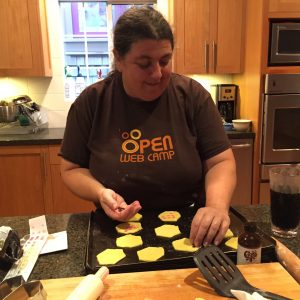 The official launch for Structured Negotiation, A Winning Alternative to Lawsuits was held on October 16, 2016 at the Ed Roberts Campus – a disability-centric, universally designed space in Berkeley California. More than 100 people helped me celebrate with yummy deserts reflecting the book’s stories.
The official launch for Structured Negotiation, A Winning Alternative to Lawsuits was held on October 16, 2016 at the Ed Roberts Campus – a disability-centric, universally designed space in Berkeley California. More than 100 people helped me celebrate with yummy deserts reflecting the book’s stories.
We had cakes designed as a Talking ATM and an accessible pedestrian signal. Cookies that web accessibility evangelist and friend Lucy Greco and I made in the shape of the book cover’s hexagons with our initials and SN in braille. Dmitri Belser, Executive Director of the Center for Accessible Technology and Board Member of ERC was a gracious host who made me feel I had chosen the perfect setting to send my book into the world. Read about the book launch party.
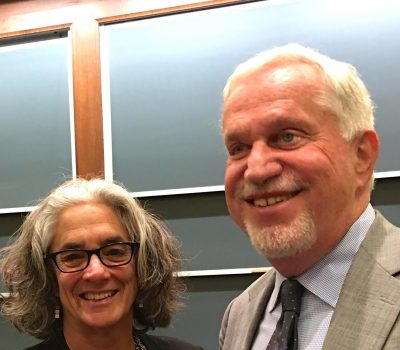 The first East Coast book event took place at Harvard Law School on November 15, 2016 sponsored by the school’s Program on Negotiation (PON). The event would not have happened without Paul Parravano, a claimant in two Structured Negotiation initiatives and a friend pictured with me here. Paul, who is Co-Director of the Office of Government and Community Relations at MIT, pretty much knows everyone. He made the connection with PON that led to the event. That evening he shared his stories of participating in Structured Negotiation as a blind professional needing financial information to be accessible.
The first East Coast book event took place at Harvard Law School on November 15, 2016 sponsored by the school’s Program on Negotiation (PON). The event would not have happened without Paul Parravano, a claimant in two Structured Negotiation initiatives and a friend pictured with me here. Paul, who is Co-Director of the Office of Government and Community Relations at MIT, pretty much knows everyone. He made the connection with PON that led to the event. That evening he shared his stories of participating in Structured Negotiation as a blind professional needing financial information to be accessible.
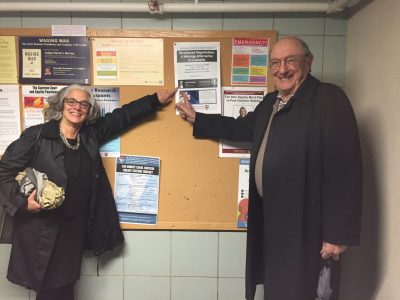 Three years later I still have appreciation for so many people who came out that night in a driving rain storm, including friends and colleagues too numerous to mention, my family who still lives in my Massachusetts hometown (including my 85 year old dad pictured with me here), and even friends from high school and summer camp. That’s what having a book can do.
Three years later I still have appreciation for so many people who came out that night in a driving rain storm, including friends and colleagues too numerous to mention, my family who still lives in my Massachusetts hometown (including my 85 year old dad pictured with me here), and even friends from high school and summer camp. That’s what having a book can do.
But there was a dark side of the run-up to the Harvard event too.
November 15, 2016, the day of the event, was one week to the day after the disastrous 2016 presidential election. My book is about a civil rights advocacy strategy that depends on trust, relationship building, and small steps toward big results. I write about optimism and how to reach agreement with less conflict, without run away costs. At its core, my book in grounded in the value of inclusion at the intersection of technology and disability.
Could any of these ideas be useful in a post-Trump world?
I actually spoke to the event organizers about whether we should move forward. I didn’t know how the specifics of the administration would play out, but I knew there was no common ground when talking about the agenda that the current president ran on. I knew law suits would be a powerful and needed tool against the civil rights onslaught we expected in November 2016.
Still, the event went forward and Paul and I shared stories from the book about how collaboration has worked to lead large organizations on the path toward accessibility without lawsuits. How relationships have developed when people learn collaborative tools of real problem solving.
And over the past three years I have become comfortable with talking about what can, and what cannot, be negotiated.
Believing in the power of Structured Negotiation does not mean negotiating over a Muslim ban, a border wall, or putting children in cages. But believing in the power of Structured Negotiation recognizes that in many situations there are ways to find solutions and to right wrongs that enhance relationships instead of breaking them. And that collaboration can lead to stronger, long lasting results because of honest information sharing and communication built though true problem solving.
I was nervous talking about that three years ago. Continued interest in the book, and learning how other people have used Structured Negotiation over the past three years has helped calm the nerves.
Oh Canada
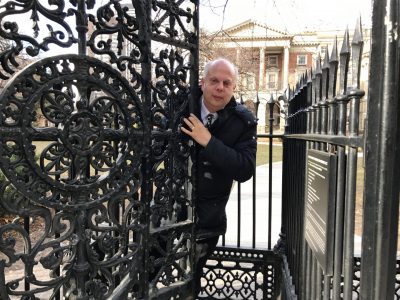 My first international foray with the book is all to the credit of my friend and Canadian disability activist David Lepofsky, pictured here in front of the Osgoode Hall Court House in Toronto. In February of 2017 David arranged a whirlwind book tour for me that including speaking at Osgoode Hall Law School, the Arch Disability Law Centre, The A11yTO Meetup, and the Advocate’s Society. David even arranged for me to be interviewed on the Canadian Public Television show The Agenda with Steve Paikin.
My first international foray with the book is all to the credit of my friend and Canadian disability activist David Lepofsky, pictured here in front of the Osgoode Hall Court House in Toronto. In February of 2017 David arranged a whirlwind book tour for me that including speaking at Osgoode Hall Law School, the Arch Disability Law Centre, The A11yTO Meetup, and the Advocate’s Society. David even arranged for me to be interviewed on the Canadian Public Television show The Agenda with Steve Paikin.
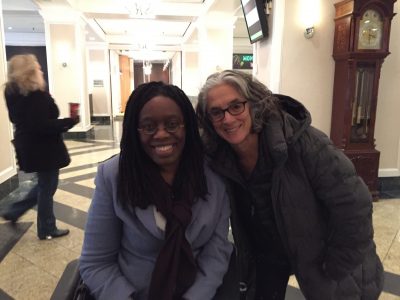 On that same trip I was hosted by disability scholar and law professor Laverne Jacobs at the University of Windsor who arranged for me to speak with her students. I also had the chance to accompany Laverne to one of the public hearings leading up to the recent passage of the Canadians with Disabilities Act.
On that same trip I was hosted by disability scholar and law professor Laverne Jacobs at the University of Windsor who arranged for me to speak with her students. I also had the chance to accompany Laverne to one of the public hearings leading up to the recent passage of the Canadians with Disabilities Act.
The early Canadian trip gave me the confidence to talk about the themes in my book to an international audience.
Gratitude!
Publishing a book has been compared to having a child, and I understand why. (Although I worked on Structured Negotiation, A Winning Alternative to Lawsuits for six years and was only pregnant with each of my daughters for 9 months!)
As with children, a book needs significant attention that first year. I was prepared for that and cleared my calendar for much of 2017 in the hope of having opportunities to speak and write about the book. I’ve been beyond grateful that there is still interest in the book’s ideas three years later.
There is one similarity between a child and a book that I was not expecting. Just as a parent never forgets a kindness extended towards their child, as an author I will never forget the many people who have shown support in connection with publication of Structured Negotiation, A Winning Alternative to Lawsuits.
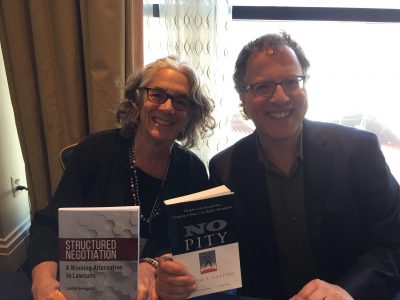 I am grateful for many things and many people. Grateful for everyone who bought the book, invited me to speak, interviewed me, published my post-book writings and invited me onto their podcasts and radio shows as I worked to spread the word. Grateful to my incredible web designer Natalie MacLees of HireDigita11y who built this website so I could share all things book related in an accessible usable way.
I am grateful for many things and many people. Grateful for everyone who bought the book, invited me to speak, interviewed me, published my post-book writings and invited me onto their podcasts and radio shows as I worked to spread the word. Grateful to my incredible web designer Natalie MacLees of HireDigita11y who built this website so I could share all things book related in an accessible usable way.
(One highlight of many is pictured here — having the opportunity to sell my book next to Joe Shapiro selling his must-read No Pity at a national NDRN conference, thanks to Ken Shiotani.)
[On the Media page of this website you can find links to many of those interviews and articles. On the Writings Page you can read many of the post-book Structured Negotiation writings. I invite readers to support the platforms you’ll find on those pages (such as the Disability Visibility Project, Day in Washington, a disability policy podcast, AXSChat, and A11yRules podcast) that supported me and so many others with books to promote and stories to tell.]
But appreciation is not just about thanking people who had platforms to invite me to be part of. I’m also grateful for everyone who attended events, emailed me a message of support, or asked a hard question that demonstrated their interest in the book.
Grateful too for my social media communities who with likes, retweets and all the rest continually demonstrate that collaborative problem solving matters and is a useful tool to advance digital accessibility.
Gratitude for Law Students and their Professors
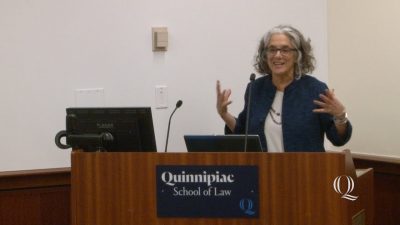 I’m grateful for law students eager to learn about Structured Negotiation because they know early in their careers that conflict needs an alternative. In the past three years I’ve had the opportunity to speak with students across the country eager to learn the tools of Structured Negotiation. I’ve learned as much from their thoughtful questions as I’m sure they’ve learned from me.
I’m grateful for law students eager to learn about Structured Negotiation because they know early in their careers that conflict needs an alternative. In the past three years I’ve had the opportunity to speak with students across the country eager to learn the tools of Structured Negotiation. I’ve learned as much from their thoughtful questions as I’m sure they’ve learned from me.
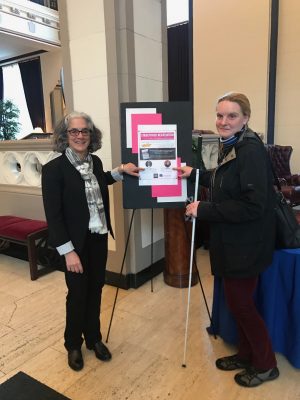 Thanks to my alma mater, Hastings College of the Law and its Center for Negotiation and Dispute Resolution who extended an early invite to Jessie Lorenz and me to share stories from the book. Jessie had been involved in several Structured Negotiation, and hearing from the “client” perspective was an important part of the evening.
Thanks to my alma mater, Hastings College of the Law and its Center for Negotiation and Dispute Resolution who extended an early invite to Jessie Lorenz and me to share stories from the book. Jessie had been involved in several Structured Negotiation, and hearing from the “client” perspective was an important part of the evening.
I’m grateful to Charlie Pillsbury of the Quinnipiac / Yale Dispute Resolution Workshop who was the first person I didn’t already know to invite me to speak. David Hoffman, who I met through my book mentor Daniel Bowling, has zoomed me into his negotiating class at Harvard for the past two years. John Lande generously welcomed me to his dispute resolution law professor list, even though I’m not a professor and don’t write in an academic style.
This month I’m particularly grateful to Moritz Law School at Ohio State University where I’ll be delivering the annual Lawrence Lecture this September. The title of my talk reflects a theme I’ve developed over the past three years to talk about Structured Negotiation: Forget the Shark and be a Dolphin: Advancing client rights and interests with collaborative negotiating tools.
Gratitude is Global
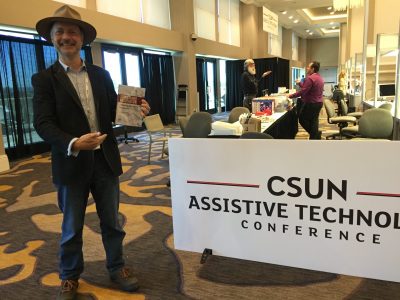 I’m grateful to friends in colleagues in other countries who found global connections in the stories shared in my book. When Andrew Arch, Senior Accessibility Consultant at Intopia pictured here, bought my book and took it back to his home in Australia I was so excited.
I’m grateful to friends in colleagues in other countries who found global connections in the stories shared in my book. When Andrew Arch, Senior Accessibility Consultant at Intopia pictured here, bought my book and took it back to his home in Australia I was so excited.
Speaking in 2018 about Structured Negotiation and digital accessibility at A11y Camp in Melbourne, on a panel in Sydney organized by Intopia with Australia’s Disability Discrimination Commissioner Alastair McEwin and Australia’s representative to the UNCRPD Committee Rosemary Kayass, and at the Blind Foundation in New Zealand were significant highlights of the past three years.
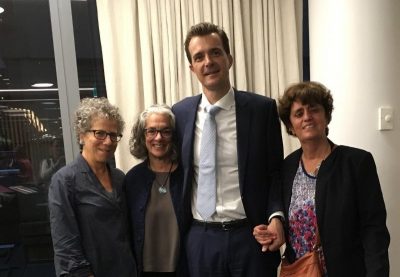 As was my first Australian talk in Sydney, arranged by Gisele Mesnage, of the Digital Gap Initiative, pictured here with Jonathan Hunyon of Sydney’s Public Interest Advocacy Centre (PIAC) and Andrea Durbach of the Australian Human Rights Centre (AHRC) of the University of New South Wales (UNSW). The DGI is a grassroots group committed to inclusion in the digital world. Gisele organized a wonderful event for me in Sydney in 2017, co-sponsored by PIAC and AHRC that we titled Structured Negotiation and the quest for equal access in the digital age: lessons from the US disability rights movement
As was my first Australian talk in Sydney, arranged by Gisele Mesnage, of the Digital Gap Initiative, pictured here with Jonathan Hunyon of Sydney’s Public Interest Advocacy Centre (PIAC) and Andrea Durbach of the Australian Human Rights Centre (AHRC) of the University of New South Wales (UNSW). The DGI is a grassroots group committed to inclusion in the digital world. Gisele organized a wonderful event for me in Sydney in 2017, co-sponsored by PIAC and AHRC that we titled Structured Negotiation and the quest for equal access in the digital age: lessons from the US disability rights movement
For international connections and support for Structured Negotiation, A Winning Alternative to Lawsuits over the past three years I owe a huge debt of gratitude to lawyer, author, and innovator J. Kim Wright. There is no greater evidence that collaborative problem solving is a global imperative than the network that Kim has created and nurtured through her speaking, training, and books, Lawyer as Peacemaker and Lawyer as Changemaker.
A recent highlight of my post-book wanderings was a Structured Negotiation workshop in Basque Country Spain this year with the Basque Association of Collaborative Lawyers and the Teale Foundation. The lawyers and staff at these organizations were Kim’s connections she generously shared. They have now become my friends and colleagues.
Gratitude for the Disability and Digital Accessibility (overlapping) Communities
I struggled to write the Structured Negotiation book in a way that would be useful to all lawyers and advocates, regardless of their practice area. And feedback from lawyers in other fields has been gratifying. But first and foremost the past three years has demonstrated to me the interest of the accessibility and disability communities in collaborative problem solving as an effective tool for advancing digital inclusion and disability civil rights.
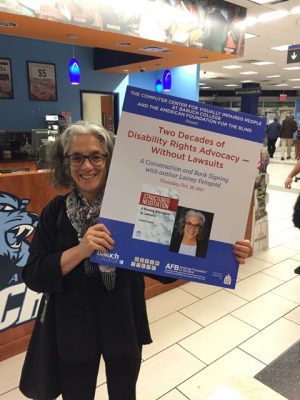 For twenty-five years blind people and their organizations have been partners in the development of Structured Negotiation, and for the past three years my friends, colleagues, clients and others in the blind community have supported my book. The picture here shows me holding the promotional poster for a wonderful event in New York sponsored by the Computer Center for Visually Impaired, then at Baruch College, and the American Foundation for the Blind.
For twenty-five years blind people and their organizations have been partners in the development of Structured Negotiation, and for the past three years my friends, colleagues, clients and others in the blind community have supported my book. The picture here shows me holding the promotional poster for a wonderful event in New York sponsored by the Computer Center for Visually Impaired, then at Baruch College, and the American Foundation for the Blind.
And my friends and colleagues at the American Council of the Blind invited me to share Structured Negotiation stories at their national convention in Reno in 2017. These are just two of many times I felt supported by the blind people whose stories I tell in the book.
Barry Taylor and Zena Naiditch of Chicago’s Equip for Equality arranged a Structured Negotiation talk in Chicago co-sponsored by JP Morgan Chase showed the value of Structured Negotiation to accessibility champions on all sides of the table. And Dennis Deacon invited me to speak at Chicago’s Accessibility MeetUp, where I saw long-time Structured Negotiation supporter (and early claimant) Kelly Pierce.
Disability Rights Tennessee invited me to Nashville to do my first Structured Negotiation workshop in February 2018. The experience showed me that a deep dive into the tools of Structured Negotiation could be valuable to advocates seeking ways to bring about change with less conflict and long-lasting results. Since then, I have shared stories and strategies from the book in workshops with designers (co-presenting with Shawn Henry,) non-lawyer advocates at the wonderful ADA Symposium, and in Spain, Australia and New Zealand. Without that first invitation from Nashville, it might have never happened.
Sitting down to gather the strands that made the last three years possible has been a personal treat. Yet it is always risky to write a post like this one. I know it’s too long for a blog post, and I know I have left people out who have my deepest appreciation.
Writing this post had an unexpected benefit. Looking over the response to my book these past three years has convinced me there is a yearning for collaborative strategies like Structured Negotiation in the world.
I hope to be able to contribute to building those conflict, people-centered alternatives through continued talks, trainings, and writings about the the ideas and stories in Structured Negotiation, A Winning Alternative to Lawsuits.
To do so I know there will be many more people to thank in the future.